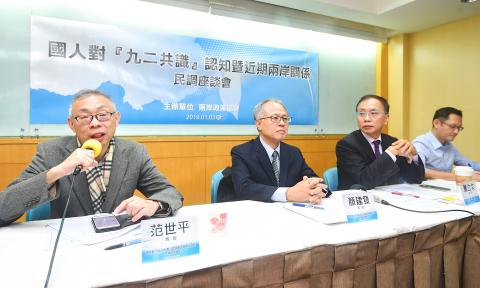More than 80 percent of Taiwanese would not accept the so-called “1992 consensus” if it meant supporting the “one China” principle, with “China” representing the People’s Republic of China (PRC), a Cross-Strait Policy Association poll showed yesterday.
The association published the poll one day after Chinese President Xi Jinping (習近平) gave a speech marking the 40th anniversary of the 1979 “Message to Compatriots in Taiwan.”
While promoting the “one county, two systems” formula, Xi said the “1992 consensus” means that “both sides of the Taiwan Strait belong to one China and will work jointly to seek national unification.”

Photo: Fang Pin-chao, Taipei Times
The “1992 consensus” — a term former Mainland Affairs Council chairman Su Chi (蘇起) admitted making up in 2000 — refers to a tacit understanding between the Chinese Nationalist Party (KMT) and the Chinese Communist Party that both sides acknowledge there is “one China,” with each side having its own interpretation of what “China” means.
Of the respondents, 84.1 percent said they would not accept the “1992 consensus” if it means supporting the idea of the PRC representing “China,” with no room left for the Republic of China (ROC), while 9 percent said they would.
Of those polled, 81.2 percent said they would not accept the “1992 consensus” if it promotes economic development at the cost of sovereignty and turns the ROC into a local government under Beijing’s control, the poll found.
Of the respondents, 54.2 percent supported reading the “1992 consensus” as meaning that each side has its own interpretation of what “China” means, with “one China” meaning the ROC.
When asked whether the “1992 consensus” is real, 45.1 percent of respondents said “no,” while 36.2 percent said “yes.”
Regarding the content of the “1992 consensus,” 55.5 percent said they did not have a clear understanding of it, while 40.2 percent said they did.
When asked to choose a definition of the “1992 consensus” that was closest to their understanding, 44.4 percent said that it means both sides of the Taiwan Strait are two different countries, while 20.9 percent said the two sides represent part of a yet-to-be-unified nation.
Of the respondents, 20.6 percent said it means each side claims to represent “China,” with 7.1 percent saying the ROC is a local government belonging to the PRC.
The poll also found that 62.6 percent of respondents approved of the government’s position respecting the historical fact that in 1992 a meeting occurred between the two institutions representing each side of the Taiwan Strait — Taiwan’s Straits Exchange Foundation and China’s Association for Relations Across the Taiwan Straits — while 28 percent disapproved.
Meanwhile, 64.1 percent of respondents said they did not agree with the statement that people do not need to know what the “1992 consensus” is as long as it brings economic benefits to Taiwan, while 91.7 said they believed that national security is as important as economic development.
The poll was conducted by telephone on Thursday and Friday last week, with 1,081 valid samples, a 2.98 point margin of error and a confidence level of 95 percent, the association said.

Taiwan’s Liu Ming-i, right, who also goes by the name Ray Liu, poses with a Chinese Taipei flag after winning the gold medal in the men’s physique 170cm competition at the International Fitness and Bodybuilding Federation Asian Championship in Ajman, United Arab Emirates, yesterday.

Costa Rica sent a group of intelligence officials to Taiwan for a short-term training program, the first time the Central American country has done so since the countries ended official diplomatic relations in 2007, a Costa Rican media outlet reported last week. Five officials from the Costa Rican Directorate of Intelligence and Security last month spent 23 days in Taipei undergoing a series of training sessions focused on national security, La Nacion reported on Friday, quoting unnamed sources. The Costa Rican government has not confirmed the report. The Chinese embassy in Costa Rica protested the news, saying in a statement issued the same

A year-long renovation of Taipei’s Bangka Park (艋舺公園) began yesterday, as city workers fenced off the site and cleared out belongings left by homeless residents who had been living there. Despite protests from displaced residents, a city official defended the government’s relocation efforts, saying transitional housing has been offered. The renovation of the park in Taipei’s Wanhua District (萬華), near Longshan Temple (龍山寺), began at 9am yesterday, as about 20 homeless people packed their belongings and left after being asked to move by city personnel. Among them was a 90-year-old woman surnamed Wang (王), who last week said that she had no plans

TO BE APPEALED: The environment ministry said coal reduction goals had to be reached within two months, which was against the principle of legitimate expectation The Taipei High Administrative Court on Thursday ruled in favor of the Taichung Environmental Protection Bureau in its administrative litigation against the Ministry of Environment for the rescission of a NT$18 million fine (US$609,570) imposed by the bureau on the Taichung Power Plant in 2019 for alleged excess coal power generation. The bureau in November 2019 revised what it said was a “slip of the pen” in the text of the operating permit granted to the plant — which is run by Taiwan Power Co (Taipower) — in October 2017. The permit originally read: “reduce coal use by 40 percent from Jan.